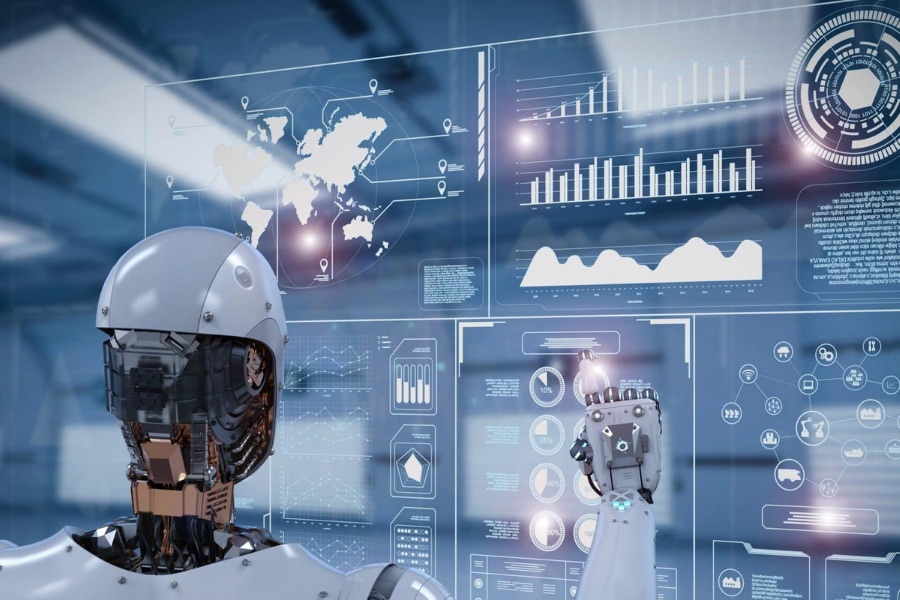AI in Business: What to Expect in 2026
November 29, 2024, 4 min read
As we approach 2026, artificial intelligence (AI) is poised to revolutionize business operations across various sectors. Companies increasingly integrate AI to enhance efficiency, decision-making, and customer experiences. This article explores the anticipated developments in AI for business by 2026, offering insights into emerging trends and practical applications.
1. Hyperautomation: Streamlining Business Processes
Hyperautomation involves the comprehensive automation of complex business processes by integrating AI, machine learning, and robotic process automation (RPA). By 2026, hyperautomation is expected to become a cornerstone of business operations, enabling companies to streamline workflows, reduce human error, and allocate resources to strategic initiatives. For instance, the Commonwealth Bank of Australia has implemented AI systems to automate tasks, resulting in a 40% reduction in call center wait times and a 50% decrease in scam losses.
2. AI-Driven Decision Making
The utilization of AI and machine learning allows businesses to analyze vast datasets, predict customer behavior, and personalize interactions at scale. By 2026, AI-driven decision-making is expected to be the norm, with companies leveraging these technologies to gain a competitive edge. For example, AI can identify patterns in customer interactions that human sales teams might overlook, enabling more targeted and effective sales strategies.
3. Data-Centric Strategies
Data is becoming the lifeblood of successful business strategies. Companies are increasingly relying on data to make informed decisions, optimize sales efforts, and deliver better customer experiences. Analyzing customer data in real time allows businesses to segment their audience more effectively, tailor messaging, and predict buying behaviors. As we move towards 2026, the role of data in business operations will continue to grow, with investments in analytics tools and platforms becoming essential.
4. Enhanced Customer Experience through Personalization
In a competitive market, personalization is no longer optional; it’s a necessity. Customers expect businesses to understand their unique needs and offer tailored solutions. Advancements in AI enable companies to gather and analyze customer data in real-time, delivering personalized experiences that build stronger relationships, increase loyalty, and drive sales. By 2026, personalization will become even more critical, with businesses leveraging AI to offer real-time customization of products and services based on individual customer preferences.
5. Evolution of Business Roles and Skills
The role of professionals is evolving with the integration of AI. Salespeople, for instance, are transitioning from solely closing deals to acting as consultants, offering value-added services and insights to customers. This shift requires a deep understanding of products, customer industries, and market trends. Additionally, the increasing reliance on technology necessitates that professionals be tech-savvy, using data and analytics to inform strategies. By 2026, the most successful professionals will combine these skills with a deep understanding of customer needs.
6. Integration of Augmented and Virtual Reality
Augmented Reality (AR) and Virtual Reality (VR) are set to revolutionize business operations by offering immersive experiences that showcase products and services in innovative ways. For example, AR can create interactive product demos, while VR can transport customers into virtual environments to experience a product firsthand. By 2026, AR and VR are expected to become more mainstream, offering businesses innovative ways to engage with customers and differentiate themselves from the competition.
7. Adoption of Blockchain for Transparency
Blockchain technology enhances transparency and security in transactions by providing a decentralized and immutable ledger. This helps businesses build trust with customers, ensuring that all transactions are transparent and secure. As blockchain technology continues to evolve, more businesses are expected to adopt it to enhance transparency and reduce fraud in their processes.
8. Growth of Integrated Platforms
The future of business operations will be shaped by the rise of integrated platforms that offer all-in-one solutions. These platforms combine customer relationship management (CRM), analytics, and marketing tools into a single interface, making it easier for teams to manage activities and gain insights into customer behavior. By 2026, integrated platforms will be the norm, with businesses leveraging these tools to drive more effective and data-driven strategies.
9. Building Ecosystems through Collaboration
Building ecosystems of partners, suppliers, and customers is becoming increasingly important as businesses become more interconnected. These ecosystems allow businesses to extend their capabilities, reach new markets, and offer more comprehensive solutions to customers. Collaboration platforms that facilitate communication and coordination within these ecosystems will play a crucial role in the future of business operations.
10. Addressing the AI Skills Gap
The rapid adoption of AI technologies has highlighted a significant skills gap in the workforce. By 2026, addressing this gap will be crucial for businesses aiming to harness the full potential of AI. Organizations are investing in AI-focused training programs and education platforms to upskill employees and ensure they can effectively utilize AI tools. For instance, initiatives by companies like IBM and PwC aim to address this through AI-focused training programs and education platforms, targeting diverse demographics, including underrepresented communities.
As we approach 2026, AI is set to transform business operations across various sectors. From hyperautomation and data-driven decision-making to personalized customer experiences and the integration of AR and VR, businesses that embrace these trends will be well-positioned to succeed. However, addressing challenges such as the AI skills gap and ensuring ethical AI practices will be crucial. By staying informed and adaptable, businesses can navigate the evolving AI landscape and leverage its potential for growth and innovation.




























